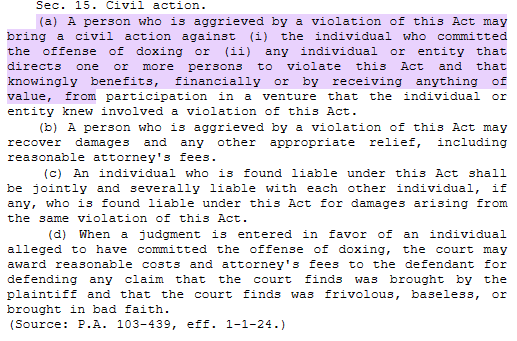Is Doxxing Illegal In Illinois?
Laura Martisiute
Reading time: 5 minutes

Table of Contents
Is doxxing illegal in Illinois? If you’re worried about personal information leaks and live in the state, you’ve come to the right place.
In this guide, we’ll cover whether doxxing is illegal in Illinois, what laws you should know, and how doxxing is treated federally throughout the United States.
We also explain in detail what steps you can take to protect yourself against doxxing so your information doesn’t get published online without your consent.
Is Doxxing Illegal in Illinois?
Yes, doxxing is illegal in Illinois under the Civil Liability for Doxing Act.
The law was passed unanimously by the Illinois State House of Representatives and Senate and signed into law by Gov. JB Pritzker in 2023. This anti-doxing law defines doxxing and outlines what constitutes personally identifiable information.
It also allows victims to sue doxxers. David Goldenberg, Midwest regional director of the Anti-Defamation League (ADL), which advocated for the law, noted that “under this bill, victims now have a way to seek recourse from their attackers.”
The Civil Liability for Doxing Act goes into effect on January 1, 2024. According to the Daily Herald, it’s the first law of this kind in the Midwest.
What Is Doxxing In Illinois?
The state of Illinois defines doxxing as the act of intentionally sharing someone’s personally identifiable information without their consent and with the intent of harming or harassing them.
To be illegal in Illinois, a doxer must doxx someone with the knowledge or disregard that the information they publicly share could lead to stalking, bodily injury, or death.

Under the Illinois doxxing law, illegal doxxing has occurred if the act of publishing information leads the doxxed person to:
- “Suffer significant economic injury or emotional distress or to fear serious bodily injury or death of the person or a family or household member” or
- “Suffer a substantial life disruption.”
What Is Personally Identifiable Information In Illinois?
Illinois defines personally identifiable information as any data that makes it possible to identify an individual, like their name or date of birth, in combination with other information that is linkable or linked to that individual.
Personally identifiable information can also include:
- Home address
- Phone number
- Email address
- Social media accounts
- Social security numbers
- Biometric data
- Medical, financial, education, consumer, or employment information/data/records
- Any other sensitive or private information, for example, gender identity or sexual orientation
- Any information that gives access to an individual’s teleconferencing.
Are There Any Exceptions to the Illinois Doxxing Law?
Under specific circumstances, publishing or sharing someone else’s information may not be considered a crime.
Primarily, the exception is related to providing information about criminal activity. When personal information is shared as part of reporting a crime, you are not violating Illinois anti-doxxing law.
Here’s when it’s legal to share personally identifiable information:
- When reporting a crime or conduct you believe to be unlawful to a law enforcement or intelligence agency.
- As part of any activities protected under free speech laws.
Can You Sue Someone for Doxxing You Under the Illinois Law?
Yes, you can sue people for doxxing attacks and get a restraining order in Illinois. If the attack causes substantial life disruption or significant economic injury, you’ll have a strong civil and criminal case based on these new policies by Illinois lawmakers.

A person found to have been doxxed under this law can recover damages and other relief, like attorney’s fees.
As state Rep. Jennifer Gong-Gershowitz said, the Illinois doxxing law “creates a way to hold accountable those who perpetuate hate online.”
Is Doxxing Illegal at the Federal Level?
In the United States, there’s no federal law making doxxing illegal. However, doxxing can intersect with other criminal offenses under federal laws.
Although no federal law covers doxxing, several American states, including California and Arizona, have taken the initiative to pass anti-doxxing laws. Others have passed laws against doxing-like behavior, for example, cyberbullying.
How to Protect Yourself Against Doxxing In Illinois (And Elsewhere)
The less sensitive personal information exists about you online, the less likely you are to get doxxed.
To find out how much of your data is available online, dox yourself. Take a look at our guide on how to do this. We also share a list of doxxing tools.
Once you’re aware of what someone could discover about you by researching you on the internet, you can reduce your digital footprint.
These might include:
- Removing your profile from data brokers and people search sites who gather your data from various online sources and then sell it to more or less anyone who wants it. Remember that you need to opt-out continuously – data brokers are known to relist your profile as soon as they find more data about you. Alternatively, sign up to a data broker removal service like DeleteMe to have privacy experts remove your data from brokers on your behalf.
- Adjusting your privacy settings on social media.
- Using unique usernames and passwords across all accounts.
- Reducing how many apps you use (apps can sell your data to brokers and people search sites).
- Removing your details from Google Search.
- Being conscious of your privacy when interacting online. Remember: the internet never forgets.
Read our guide on how to prevent doxxing for more information.
Our privacy advisors:
- Continuously find and remove your sensitive data online
- Stop companies from selling your data – all year long
- Have removed 35M+ records
of personal data from the web
Save 10% on any individual and
family privacy plan
with code: BLOG10
news?
Don’t have the time?
DeleteMe is our premium privacy service that removes you from more than 750 data brokers like Whitepages, Spokeo, BeenVerified, plus many more.
Save 10% on DeleteMe when you use the code BLOG10.

















